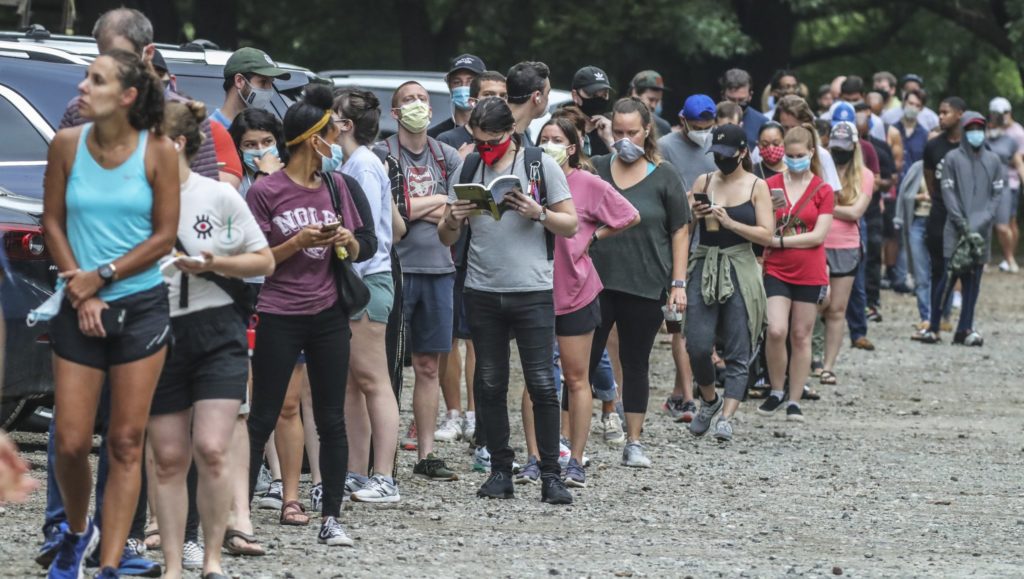The problem with complacency over the Georgia vote suppression statute

Nate Cohn has a plea for complacency over Georgia’s new voting law that has already earned the praise of one libertarian journalist:
deSiGNeD to PreVenT fRaud pic.twitter.com/8rkz9FVSu9— Scott Lemieux (@LemieuxLGM) April 3, 2021
I don’t hold Cohn responsible for this, of course, but his analysis is too charitable toward the Georgia law in a couple respects. After conceding that the bill makes “absentee” voting harder, he claims that the bill makes voting in person easier:
On balance, it might make in-person voting easier, especially in the general election (though it contains provisions that cut in both directions).
The law expands the number of required days of early voting, including on the weekend days that progressives covet (two Saturdays are now required instead of one).
As the more detailed and comprehensive analysis published in the Times yesterday points out, however, this is very misleading. Large urban areas where lines are the biggest problem already has these days of early voting; this provision will only have any impact on (Republican-leaning) rural counties:
These new strict rules on early voting hours are likely to curtail voting access for Georgians who work daytime hours or have less flexible schedules and who may be unable to return an absentee ballot.
The provision requires counties to hold early voting during weekday working hours — 9 a.m. to 5 p.m. — and says it may be held for longer but may not take place before 7 a.m. or after 7 p.m. on those days. The early voting period will begin four weeks before an election. The previous iteration of the law called only for early voting during “normal business hours” and left it up to counties to determine those hours.
The provision also adds a second required Saturday of early voting (the previous law required only one), which will increase access to early voting in most of the state’s rural counties, where election administrators have often been short-staffed and have offered fewer hours of early voting. Most larger counties in the state already offered multiple weekend days of early voting.
The law doesn’t require the availability of early voting on Sundays, which means that counties can choose whether to open for early voting on up to two Sundays before an election.
Counties that choose not to open on Sundays would be limiting ballot access for parishioners at Black churches that have often organized parishioners to vote after Sunday services.
To describe this provision as expanding access to early voting across the board is wrong. It will do nothing to alleviate lines in the dense urban areas where people face the biggest burdens to in-person voting.
Continuing with Cohn:
There’s also a provision that requires large precincts with long lines to add machines, add staff or split the precinct. Depending on how this is rolled out, it could be a big win for voters in Georgia’s urban areas, who have dealt with some of the longest lines in the country.
That “depending on how this is rolled out” is going a lot of work. The text of the statute requires very little to actually be done:

If there were long lines in the last election, superintendents have to do…something. There’s no requirement that lines be materially reduced, no provision of additional resources. There’s very little reason to be optimistic about how the Republicans in charge of the state’s election machinery will apply these vague provisions, particularly since (as Cohn doesn’t mention) the statute targeted a method that Fulton County used to try to alleviate lines and banned it. From yesterday’s Times article:
Last year, Fulton County, which includes most of Atlanta, had two recreational vehicles that traversed the county during the early voting periods, effectively bringing polling sites to people at churches, parks and public libraries. In the November election, more than 11,200 people voted at the two vehicles in Fulton County.
Georgia has now outlawed this practice, unless the governor declares a state of emergency to allow it — something that Mr. Kemp, a Republican, is unlikely to do given that it could increase voter turnout in Atlanta.
It is true, as Cohn goes on to say, that the impact of this kind of vote suppression measure has historically been modest, particularly when measures incite a backlash. However:
- Georgia’s presidential election was decided last year by a margin of .3%, which was also the margin by which Ossoff forced a runoff. Effects don’t have to be large to be meaningful, and social science research is too noisy to be confident that the suppression measures couldn’t have flipped this outcome.
- Making it harder for certain segments of the population to vote is bad in itself. The fact that historically marginalized groups are often willing to put up with a lot of inconvenience to vote doesn’t make such inconveniences right.
- The vote suppression measures (severely limiting dropboxes, Voter ID, cutting the absentee ballot request period in half, making it harder for people who show up to the wrong polling place, restrictions on extended voting hours) are concrete, while the alleged expansions are either irrelevant to the precincts with the worst lines (early voting) or vague requirements whose effects are uncertain but in context are likely to be minor at best (admonitions to precincts with long lines.)
This is a bad law, restricting the vote in many ways in order to address imaginary “voting fraud,” and there’s no reason to be complacent about it.
…And yes, while Cohn mentions this, this remains the biggest part of the statute in itself as well as reason not to interpret anything else in the statute charitably:
The law allows the (gerrymandered, hopelessly GOP) state legislature to step in and adjudicate elections post-voting. Is there ANYONE who thinks that Biden or Ossoff or Warnock would have won if that had been an option in 2020-21?
…More from Elliott Morris here.


